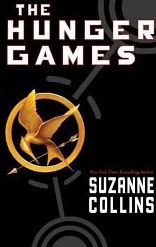 I just finished Suzanne Collin’s first book in the Hunger Games Trilogy. It was a compelling, fast-paced read in an intriguing world with chilling rules and political complications that captivate the reader.
I just finished Suzanne Collin’s first book in the Hunger Games Trilogy. It was a compelling, fast-paced read in an intriguing world with chilling rules and political complications that captivate the reader.
I found our main character, sixteen-year-old Katniss, to be a strong-willed, tough and likeable character. She is not without her weaknesses. Soon after the story opens, her love for her little sister, Prim, forces her to take Prim’s place when the twelve-year-old’s name is drawn in the cruel lottery that will cast children into an arena for the annual sport of watching them kill each other until the last one remaining is the victor of Panem’s Hunger Games.
Katniss must leave her home in District Twelve, where hunger was a constant threat and where she was the ultimate provider for her mother and Prim in the absence of her father, who died in a tragic accident. Katniss also leaves behind her friend and fellow hunter, Gale.
As Katniss prepares for her ordeal within the Hunger Games arena, she is surprised to discover that the other tribute from her district, a boy named Peeta, has declared his affection for her on the national interview of all contestants.
Katniss’s game, once she and the other contestants are thrust into the arena, is one of physical survival and trickery, as well as that of the heart. The game is completely televised and Katniss must play up the romance that Peeta has initiated in order to earn favor from her corporate sponsors. It is only at the end of the game, when she and Peeta foil the plans of the government and emerge as joint champions, that Katniss discovers Peeta’s affection for her was not contrived, but genuine the entire time.
She feels a mounting terror as she and Peeta board a train headed back to their district where a celebration awaits them, as well as the intense scrutiny of the government. This government designed the Hunger Games to force the rebellious districts into submission with the constant reminder that they can and will kill the subjects’ children if they have to. Katniss has angered the government by refusing to turn against Peeta when he and she stood as the sole survivors of the Games, and the government will not forget this easily.
This book begs the question–how far are you willing to go and who would you hurt in order to survive?
A few thoughts from me, as a reader and as a writer. First, as a reader, I found the ending particularly unsatisfying. I’m not against sequels or cliffhangers, but I believe that books should be complete and stand on their own. If they are bound separately, they should themselves be separate and whole stories.
There was no reunion with Katniss’s family, no resolution in her heart about what she would do once she returned home. There is also the question about Peeta and Gale, two men who have cropped up in Katniss’s mind as potential rivals for her affection. Although I’m personally a little tired of love triangles in literature, I would have liked to hear Katniss making some sort of plan for her first line of action, instead of just hesitating in fear and anxiety until the book closes. It didn’t seem characteristic of her.
It also seemed to me that this book didn’t really have an Act 3 to its structure. There was the Act 1 of Katniss’s life prior to the drawing of the lottery, there was the battle of the Games and her survival as an Act 2, and there was the beginning of her return home, but no completion of a third act.
I don’t particularly enjoy when people offer criticism without offering a possible solution as well. Thus, from a writer’s perspective, I would have allowed Katniss to return home, gain comfort, perhaps even wisdom while she is there. We have her mentor, Haymitch, who could serve as some voice of advice in her last moments.
I would have rather had her confront Gale face-to-face and realize that she has feelings for both him and Peeta.
I would have liked the relief of a respite for our poor heroine, that sense of “Today I can rest in the peace of my home and the love of my family. Tomorrow I will face the world. But that’s tomorrow.”
I would have wanted to read the next book, even if it had a slower ending like the one above.
Overall, I greatly enjoyed this piece of literature. The characters and the world were well-drawn, there were several layers of mystery that pull the reader into the next chapter of the saga, and the characters felt real and convincing.
Inspiration for the concept of the Hunger Games was drawn from the Greek myth of Theseus in which the young men and women of Crete are fed to the Minotaur by order of the King of Crete, who wants to punish the kingdom of Athens by killing its children.
I would recommend this book to just about anyone, and my only caveat is I’d advise you not start on a night if you have to get up early the next morning. 🙂
Rebekah
31 Dec 2010Love this blog!